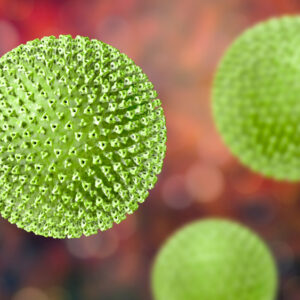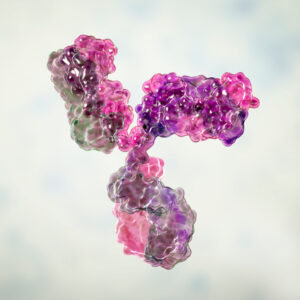Rotavirus
Rotavirus is a contagious virus that can cause gastroenteritis. Symptoms include severe, watery diarrhoea, vomiting, fever and abdominal pain. Infants and young children are most likely to contract rotavirus disease. Patients can become severely dehydrated, require hospitalisation and can even die.
The Native Antigen Company has developed a highly specific monoclonal antibody for research into Rotavirus infection.
Rotavirus Background
The genus rotavirus belongs to the Reoviridae family of viruses. Rotaviruses are non-enveloped, double-stranded RNA (dsRNA) viruses, capable of infecting animals, birds and humans. In the mature virion, a complex triple-layered viral capsid surrounds a genome, composed of eleven segments of dsRNA. These RNA segments code for 6 structural and 6 non-structural proteins (CDC). Rotavirus are classified according to the serological reactivity and genetic variability of the structural VP6 protein. Currently, eight species of rotavirus are recognised and are referred to as groups A-H. Group A rotaviruses are the most common cause of human disease, but group B and C rotaviruses have also been found to infect humans.
Rotavirus is transmitted from person-to-person by the faecal-oral route, via contact with faeces contaminated clothing, surfaces and infected individuals. Occasionally, the virus can be transmitted via respiratory droplets produced by coughing or sneezing. Rotavirus infection is the most common cause of severe diarrhoea in infants and young children worldwide. Symptoms of rotavirus infection include lethargy, fever, vomiting, abdominal pain, severe watery diarrhoea and dehydration. Severe dehydration can often lead to hospitalisation and in some cases death. Rotavirus infection in older children and adults may be mild or even asymptomatic.
Effective vaccines are available which have helped to reduce severe diarrhoea and childhood mortality caused by rotavirus infection. However, rotavirus continues to have a major global impact on childhood morbidity and mortality, particularly in developing countries (WHO).
References
- Centers for Disease Control and Prevention: Rotavirus
- World health organization: Rotavirus
Rotavirus Antigens
We are pleased to offer two Rotavirus antigens, a recombinant VP7 protein and a rotavirus lysate.
Rotavirus Antibodies
Our monoclonal rotavirus antibody, clone R15, is specific to the VP6 structural protein of rotavirus. R15 does not cross-react with other organisms causing gastrointestinal infection, including Campylobacter spp., Clostridium difficile, Escherichia coli, Listeria monocytogenes, Salmonella spp., Shigella spp., Yersinia enterocolitica, Enterovirus, Norovirus, Astrovirus, Adenovirus, Cryptosporidium parvum, Giardia lamblia, Helicobacter pylori, Entamoeba histolytica, Staphylococcus aureus.
Questions?
Check out our FAQ section for answers to the most frequently asked questions about our website and company.


